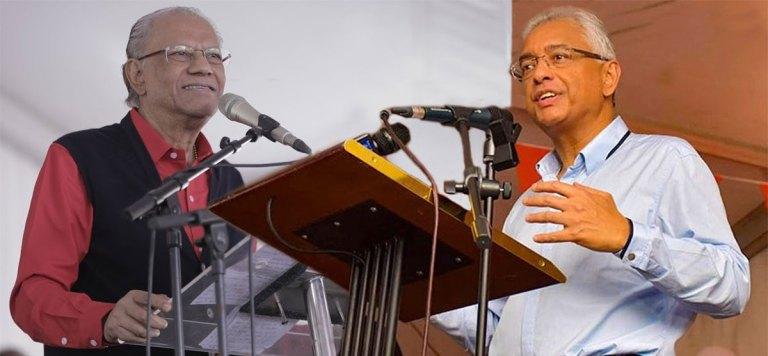Africa-Press – Mauritius. In the political annals of the country, the year 2019 will be remembered as the year which was marked by the return to power of the MSM in favor of the general elections with, as a bonus, a stable majority acquired by a ballot. other since 2014.
This is true if we disregard another no less important development that occurred in 2019, notably the judgment of the International Court of Justice in favor of Mauritius in the dispute between it and Great Britain on the subject of sovereignty over the Chagos Archipelago.
It goes without saying that, at the national level, it is the reappointment of the outgoing government that will have the most impact on politics and the economy in the years to come.
Indeed, it is the type of society in which Mauritians hope to live that is the issue of governance in this term of office and beyond. Each national election is an opportunity for the people to choose their destiny between Continuity or Change.
The change can be superficial, which means changing tenants at the Government House without questioning the system in a simple alternation of power. Which can be radical, which suggests changing the whole system of government.
Over the past 50 years, people have bet on one or the other, speaking out for either a big idea or maintaining the status quo. Historical context Here we need to do a brief historical review to better understand the political evolution in a multiracial country seen through the prism of representative democracy, and to identify the trends from one ballot to another.
In 1967, the idea of political independence which was proposed by the Labor Party and its allies, with all the hopes raised, won the majority of the votes (56%) in favor of a change in the constitutional status of the country. However, the seeds of multiple and conflicting, even contradictory, identities were already sown during the period preceding decolonization.
In 1976, at the height of the ideological debate between capitalism and socialism, the alternative society project proposed by the opposition MMM party was not supported by an absolute majority of the electorate, because a good part was seduced by the The idea of free education proposed by the PTr, which was a desirable expansion of the welfare state.
In 1982, disenchanted with the country’s economic situation, the people voted overwhelmingly for a change in society against the backdrop of the class struggle. However, this hope of socialism was not to last long.
In the subsequent elections in 1983 and 1987, ideology gave way squarely to identity politics, which were to play a preponderant role in the choice of elected officials. In the elections of 1991, 1995 and 2000, identity withdrawal was relegated to the background with the formation of national alliances in contention.
In contrast, the ethnic identity of the contenders for supreme power was forcefully projected as a decisive factor in deciding the outcome of the elections in 2005 and 2010.
It should be noted that from 1983 to 2010, no great idea of society was sold to the population since some parties were content to campaign for the preservation of the social structure of power against the aspirations of other parties.
In 2014, the idea of a Second Republic proposed by the PTr-MMM alliance to rebalance power at the highest levels of state was innovative, but it was rejected by the electorate.
In 2019, the people opted for the continuation of the status quo in the tri-nominal ballot with a relative majority, which once again revealed the large gap between the number of votes and the number of seats obtained by each party, thus accentuating criticism.
against the shortcomings of the electoral system. Political paradigm In 50 years, the political paradigm has not changed in Mauritius. It is always based on the relationship between the center and the periphery of political power, whereby the majority occupies the center and accommodates the minorities on the periphery.
This report, effectively supported by an imperfect representative democracy, ensured social stability in the country unlike other countries where multiple identities (described as murderous by Amin Maalouf, author of ‘Murderous identities’ and’ The sinking of civilizations ‘) inflamed ethnic divisions, posing a permanent threat to civil peace.
Some observers saw the results of the November 7 election as a return of identity reflexes among the electorate. Yet he had the choice between two main contenders for power from the same ethnic group.
Another example cited is the mix of votes in some urban constituencies in favor of candidates from different parties with the same ethnic profile. Other analysts do not find an evil intent in the electorate’s choice.
Rather, they see it as an expression of traditional communitarianism that elects those he considers close to the aspirations of this electorate, its certainties and its fears.
In the absence of strong ideologies separating the protagonists, the 2019 election was expected to be played out on three issues: morality, the method of governance and the electoral platform. The campaign themes were inspired by it, but they fell short of electorate enthusiasm.
First, the idea of moralizing public life, translated into a more energetic fight against corruption, nepotism and fraud, obviously did not impress voters because of the “moral equivalence” between the voters.
two main competitors. Then, the method of governance was not a factor of differentiation between them as they both dragged pots and pans accumulated during their reign.
The “rupture” promised by the PTr was more of a slogan than a well-articulated theory of governance. In the end, the debate over party platforms boiled down to a list of similar promises.
With a few exceptions, all the programs were alike insofar as the main parties shared a consensus on the country’s economic orientations and all claimed to be center-left (social democracy).
Transactional policy What ultimately decided the parties at the finish line was the effectiveness of their transactional policies. Governing is an art, but winning elections and getting MPs elected is a science in some liberal democracies these days.
Thus, politics, instead of being the springboard for a social project, has taken on a transactional nature. It is about using micro-marketing techniques to target specific layers of the electorate, assess their priority needs and formulate promises to attract them to the electoral pool.
The aim is to gain political loyalty from these groups of voters by listening to them and responding to their demands. The MSM, first, targeted entire groups: retired people (increase in old-age pension), civil servants (early application of the PRB report), taxi drivers (promise of a payment of Rs 100, 00 for the purchase of a car) and urban taxpayers (abolition of the real estate tax on a house).
The aggregation of these target groups was important and produced definite electoral dividends for the MSM. “Politics, instead of being the springboard for a social project, has taken on a transactional nature.
It is about using micro-marketing techniques to target specific layers of the electorate, assess their priority needs and formulate promises to attract them to the electoral pool. The goal is to politically retain these groups of voters . . .
The MSM, first of all, targeted entire groups: retired people (increase in old-age pension), civil servants (early application of the PRB report), taxi drivers (promise of a payment of Rs 100.00 for the purchase of a car) and urban taxpayers (abolition of the property tax on a house).
The aggregation of these target groups was important and it produced definite electoral dividends . . . ” Economic paradigm Transactional politics have thus become the norm in electoral strategy.
It does not change the economic paradigm that has been in place for decades. Quite the contrary. It makes adjustments to certain policies (old age pensions, civil servants’ salaries, direct social transfers) without calling into question the macroeconomic framework.
Yet it is the economic paradigm that poses the problem today with the slowdown in the various sectors of the economy (manufacturing, tourism, agriculture, financial services).
The country’s business model needs to be reinvented by reassessing the strengths and weaknesses as well as the opportunities and threats on the horizon. The economic paradigm has evolved during successive periods of liberalism:
The 1983-2000 period marked by initial liberalism (the abolition of exchange controls, export tax incentives, lower tariffs on imports, the establishment of the offshore sector);
The 2000-2005 period marked by advanced liberalism (consolidation and centralization of the sugar sector, business facilitation, fragmentation of land and luxury residences for foreign investors; tax exemption for export sugar);
The period 2005-2014 marked by unbridled neo-liberalism (light taxation with the uniform 15% tax on income and profits, the relaxation of rules on the award of contracts, market deregulation);
The 2015-2019 period marked by neoliberalism tempered by the expansion of the welfare state, the introduction of the negative tax, the minimum wage, the increase in pensions and social benefits, etc.
There is a willingness to mitigate market externalities and help vulnerable groups. The challenges of the future There is an outcry in the world against the model of neo-liberalism which has deepened the inequalities of income and wealth between social classes (as rigorously demonstrated by Thomas Piketty in his book ‘Capital in the 21st Century’) under the effect of the accumulation of capital by the owners and investors (1%), accompanied by the regression of the lot of workers and employees (99%).
The digital economy, global warming, the automation of tasks, the robotization of operations, the outsourcing of services, artificial intelligence (autonomous vehicles, robotic advisory services) and the sharing economy (Airbnb, Uber) pose existential threats to entire sections of the traditional economy and to jobs.
The relations of production change in society. Mauritius is not exempt from these changes and dynamics as it is so integrated into the world economy. As an alternative, the progressives propose an advanced social democracy within the framework of the mixed economy based on a policy of redistribution of wealth based on the progressive tax, the wealth tax and the guaranteed basic income.
Sustainable development – based on renewable resources and the end of economic growth – is privileged. This is the reflection that is underway in developed countries beyond a term of office.
For More News And Analysis About Mauritius Follow Africa-Press







